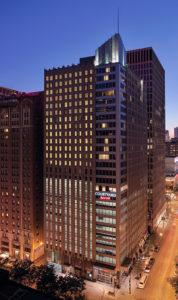BETHESDA, MD—Like a major part in a well-oiled machine, Ross H. Bierkan has made a smooth segue into the C-suite at RLJ Lodging Trust after officially being named president/CEO of the lodging REIT.
The industry veteran had filled the executive role on an interim basis following the resignation last spring of Thomas J. Baltimore Jr., who departed the company he co-founded with Executive Chairman Robert L. Johnson, to helm a planned hotel REIT by Hilton Worldwide.
Bierkan worked hand-in-glove with Johnson and Baltimore for almost two decades, beginning with the REIT’s forerunner, RLJ Development Co. (and its two investment funds), where he served as principal/EVP, through to the creation of the REIT and its IPO in 2011, serving as its chief investment officer, a title he will keep alongside his current role.
Now with executive sway over 125 owned hotels in almost two dozen states, Bierkan is sanguine about the transition—which includes his addition to the firm’s board of trustees—in a period that sees lodging REITs less patently aggressive than in the past vis-à-vis transactions.
“RLJ was built for times like this where things might get a little bit choppy out there. We invest in an asset class within the hospitality industry that is a good, all-weather strategy: upscale, select-service hotels and streamlined full-service hotels that are largely transient based, without a lot of peripheral food and beverage or other amenities; lean operating models. And often perceived as a value proposition by consumers in a softening market,” said Bierkan, who considers the segments “a better mousetrap” in terms of producing a higher return on invested capital.
“In addition, we’ve got a fortress balance sheet, very low leverage that protects us during a period when RevPAR might be decelerating. And more than being a defensive posture, it also positions us to go on offense when conditions dictate. So, we feel good about how we’re positioned but we haven’t been immune to what’s happened to the public REITs in this environment of decelerating RevPAR,” he said.
The CEO cited Wall Street among one of the factors driving perception around the lodging sector.
“The Street decided months ago to vote with their feet, and the share prices of all the REITs fell over the past 12 months, although we’ve all recovered since the lows in February. But even with that recovery, we’re still trading at levels that imply multiples that persuade us to be net sellers in this environment,” said Bierkan.

RLJ Lodging Trust last year reinvented a student housing/apartment building, repositioning it as the Courtyard San Francisco Union Square.
Even though Baltimore’s departure created what Bierkan described as “shock and awe,” his insertion into the interim post countered any thought of major disruption at the REIT. And while a search chair was established, no search was ever conducted, he said.
“The board quickly realized the house wasn’t on fire,” said Bierkan, noting the senior team has an average tenure of 14 years. “This was a senior team before we ever went public.”
Bierkan also had the staunch support of Johnson. “Even though I had the interim tag, he wanted me to assert myself as though that tag didn’t exist and take the reins and run the company. Fortunately, within about 70, 80 days, the board saw fit to remove the tag. The removal of the tag hasn’t changed my responsibilities at all,” he said.
Bierkan told Hotel Business he doesn’t feel the need to make “substantive” changes, as the REIT’s efforts have long been a collaborative process. “Probably the biggest change I made is recommending to the board that we add the title of chief operating officer to Leslie Hale’s title of chief financial officer [which has been done]. In my mind that was a no-brainer. Leslie has distinguished herself among the senior team here for years as a thought leader. Her work ethic and her talent stand out… In general, I suppose that’s an indicator of how I might govern going forward; very collaborative, very inclusive.”
The shifts at the top apparently also had scant negative impact on the REIT’s Q2 fundamentals, which were positive. ADR was up 1.6%, occupancy was up 0.4% and RevPAR was up 1.9%. Funds from operations (FFO) increased 4.2% to $102.1 million and net income increased 4.1% to $58.7 million.
Now, with second half underway, Bierkan assessed some influencers affecting the lodging landscape.
“Headwinds definitely include the new supply in New York; there’s no denying it. It’s been going on since 2011 and it appears, based on the pipeline, that it’s going to be a challenge through 2018 and possibly beyond. Fortunately, in New York, demand has been pretty strong and has been keeping up with the new supply to date. But the loss of full compression days in the city has dampened that premium-pricing opportunity you get with a full, citywide sell-out,” said Bierkan.
Similarly, in Houston, the weakness in the oil and gas industries “has hurt that market more than any other, if you exclude some of the small towns in the shale formations around the country,” said Bierkan. And while business from oil and gas companies represents only 14% of RLJ’s business, “when the tide goes out in a city like Houston, it affects all boats and we were not immune from the impact,” he said.
Still, the CEO sees it getting “a little bit easier” in second half in Houston specific to RLJ.
“We do have some tailwinds in the Houston market that might help us. We had four assets under renovation last year and this year we won’t have that disruption in second half and we should have the benefit of a refreshed product,” said Bierkan. “We also had a new hotel come online. We converted an apartment tower to a SpringHill Suites [Houston Downtown/Convention Center] last year and it came online [August 2015]. It’s one of three hotels that share a footprint in the Humble Oil Tower. RLJ has the benefit of it being a young hotel that’s ramping up so that should provide us with a little bit of juice in our numbers. So, we’re cautiously hopeful that we will outperform in a very soft market.
“The good news is Houston and New York are about 10-11% of our portfolio at this point,” he continued, “Which is down from a much higher number because we’ve worked very hard at acquiring assets over the past few years in high-growth markets like Northern California and Portland and they help balance the effect.”
Another influence could be the pending merger [at press time]of Marriott International and Starwood Hotels and Resorts Worldwide. With a portfolio weighted with Marriott (and Hilton) product, Bierkan said as RLJ’s CEO he would be “watching—carefully—the impact issues.” However, he added, “I think the combined strength of the two reservations systems impresses, and the leadership at Marriott will do a good job of integrating all those brands.”
Overall, the new CEO—who in his career track has worked for Guest Quarters Hotels [now DoubleTree Suites by Hilton], Grubb and Ellis Real Estate and The Plasencia Group—is casting his seasoned eyes on different aspects of the industry, looking at everything from the lifestyle space to what’s happening internationally.
Asked if expansion beyond domestic borders was a possibility, he didn’t rule it out. “We’ve had some discussions about that internally but we have no near-term plans to expand outside the country. We do recognize that upscale, select-service within the major brand families is an underserved asset class in most international capital cities and so as local developers in those cities begin to open up Courtyards and Hilton Garden Inns and Hyatt Places around the world, we’ll be watching. Eventually, there will be a critical mass of them and we’ll have to re-evaluate whether we want to wade into those waters,” said Bierkan.

Properties in gateway cities with high barriers to entry also are part of the RLJ portfolio, such as the Homewood Suites by Hilton in Washington, DC, (shown here) and the Courtyard by Marriott Magnificent Mile in Chicago.
In contrast, the CEO said RLJ has done a “great job” over the past three years of “increasing our wading” west of the Mississippi and the Rocky Mountains. “We’re very pleased to now have Northern California as our largest, single market and we continue to have enthusiasm for the West Coast markets,” he said.
For example, last year, RLJ reinvented a student housing/apartment building, gutting it and repositioning it as the Courtyard San Francisco Union Square. Bierkan expects the ramping-up hotel to run counter to expected flat or declining RevPAR in the city’s hotels due to the construction that’s part of the $500 million expansion at Moscone Center. “We’re cautiously optimistic we can outperform in that environment,” he said.
RLJ also has interest in “any of the other markets in the United States where jobs growth is strong…but we don’t soft circle any one market and obsess over getting a presence there. Unlike the brands, there’s no strategic imperative for us to own in any specific market,” Bierkan said.
“If we were private, we’d be looking at making some opportunistic acquisitions. But as a public company, with our current multiple, our shareholders expect us to be prudent allocators of capital and our multiple persuades us that we should probably be a net seller. That’s because the multiples at which we can sell certain selective hotels are better than where we’re currently trading. We can sell those assets and buy back our own stock and that would be an accretive use of our capital today,” said Bierkan, noting the REIT has sold 43 hotels since going public five years ago. HB


